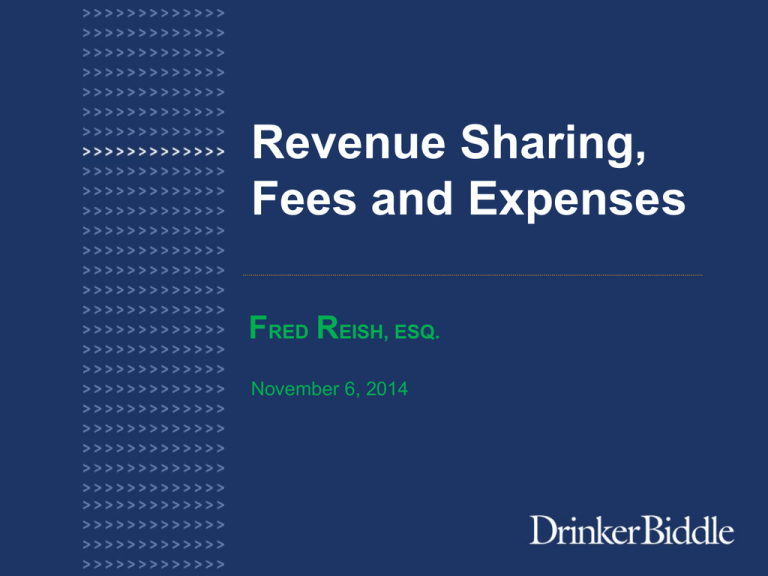
Revenue Sharing,
Fees and Expenses
FRED REISH, ESQ.
November 6, 2014
What is Revenue Sharing?
Revenue sharing is not a defined term in ERISA.
Instead, ERISA refers to “money and things of
monetary value.”
However, in the 401(k) community, “revenue
sharing” refers to money (and credits) from
investments—usually
mutual
funds—to
recordkeepers for their services for the mutual
funds.
That
can
include
12b-1
fees,
administrative service fees, and subtransfer
agency fees.
Revenue Sharing, Fees and Expenses | November 6, 2014
1
1
Focus on Revenue Sharing
In recent years, attention has been focused on
revenue sharing. That interest has grown with the
class action litigation against large 401(k) plans
and the 408(b)(2) disclosures for recordkeepers.
The heightened awareness of—and sensitivity
to—revenue sharing has led to the question . . .
“Now that fiduciaries know about the amounts
being paid as revenue sharing, how should they
handle it?”
Revenue Sharing, Fees and Expenses | November 6, 2014
2
2
Revenue Sharing
There are three basic ways to allocate revenue
sharing:
Pro-rata
Per capita
Equalization
Revenue Sharing, Fees and Expenses | November 6, 2014
3
3
Revenue Sharing
There are three models for revenue sharing:
No revenue sharing
-- allocate expenses
Pay plan expenses
-- or pay plan expenses from expense
recapture account
Allocate revenue sharing and plan expenses
Revenue Sharing, Fees and Expenses | November 6, 2014
4
4
The Law on Allocations
There is not clear guidance on how revenue
sharing should be allocated among participant
accounts.
However, what is settled is that fiduciaries must
engage in a prudent process and must apply the
general principles of ERISA to make decisions
about these questions.
Revenue Sharing, Fees and Expenses | November 6, 2014
5
5
A Prudent Fiduciary Process
The general requirement is that fiduciaries engage in
a prudent process for making their decisions that will
lead to “informed and reasoned” decisions.
This means that fiduciaries must gather and analyze
the facts that are relevant to the decision and then
make an informed decision that bears a reasonable
relationship to that information.
Revenue Sharing, Fees and Expenses | November 6, 2014
6
6
Failure to Decide
The failure to make a decision is, in essence, a
decision; it is a decision made without analysis and
by default.
In failing to engage in a decision-making process,
the fiduciaries fail to weigh the interests of the
participants who invest in higher-expense funds
(with higher revenue sharing) versus those who
invest in funds that may be lower expense, lower or
non-revenue sharing.
Revenue Sharing, Fees and Expenses | November 6, 2014
7
7
DOL Guidance on Similar Issues
Fiduciaries must make prudent decisions about
allocation of:
Revenue sharing.
Expenses.
Recoveries such as:
• Late trading and market timing.
• Litigation proceeds.
• Demutualization proceeds.
Revenue Sharing, Fees and Expenses | November 6, 2014
8
8
Allocation of Expenses
Revenue sharing can be viewed as a “negative
expense.” As a result, the DOL’s guidance on the
allocation of expenses is helpful.
The DOL has said that the allocation of expenses
among participant accounts is a fiduciary act, which
requires fiduciaries to act prudently.
The DOL addressed the prudent process
requirement for expenses in Field Assistance Bulletin
2003-03.
Revenue Sharing, Fees and Expenses | November 6, 2014
9
9
Allocation of Expenses
The FAB lays out the following principles:
•
The fiduciaries must engage in a deliberative,
prudent process;
•
They must weigh the interests of different classes
of participants and the effect the method of
allocation they chose has on those participants;
•
The method of allocation must have a reasonable
relationship to the services being provided to the
participants;
•
The fiduciaries must avoid conflicts of interest.
Revenue Sharing, Fees and Expenses | November 6, 2014
10
10
Allocation of Expenses
The FAB goes on to note:
The two principal issues raised with respect to the
allocation of plan expenses in defined contribution
plans involve:
•
the extent to which plan expenses may properly
be charged to an individual participant, rather
than plan participants as a whole.
•
the extent to which plan expenses are required to
be allocated on a pro rata, rather than per capita,
basis.
Revenue Sharing, Fees and Expenses | November 6, 2014
11
11
Allocation of Expenses
The FAB notes:
Prudence in such instances would, at a minimum,
require a process by which the fiduciary weighs the
competing interests of various classes of the plan’s
participants and the effects of various allocation
methods on those interests.
In this regard, a method of allocating expenses would
not fail to be “solely in the interest of participants”
merely because the selected method disfavors one
class of participants, provided that a rational basis
exists for the selected method. [Emphasis added.]
Revenue Sharing, Fees and Expenses | November 6, 2014
12
12
Allocation of Expenses
The FAB continues:
Where the method of allocating expenses is
determined by the plan sponsor (i.e., set forth in the
plan documents), fiduciaries, consistent with section
404(a)(1)(D), will be required to follow the prescribed
method of allocation.
When the plan documents are silent or ambiguous
on this issue, fiduciaries must select the method or
methods for allocating plan expenses. A plan fiduciary
must be prudent in the selection of the method of
allocation. [Emphasis added.]
continued . . .
Revenue Sharing, Fees and Expenses | November 6, 2014
13
13
Allocation of Expenses
Continued . . .
On the other hand, if a method of allocation has no
reasonable relationship to the services furnished or
available to an individual account, a case might be
made that the fiduciary breached his fiduciary duties to
act prudently and “solely in the interest of participants”
in selecting the allocation method.
continued . . .
Revenue Sharing, Fees and Expenses | November 6, 2014
14
14
Allocation of Expenses
Continued . . .
While a pro rata method of allocating expenses
among individual accounts (i.e., allocations made on
the basis of assets in the individual account) would
appear in most cases to be an equitable method of
allocation of expenses among participants, it is not the
only permissible method.
A per capita method of allocating expenses among
individual accounts (i.e., expenses charged equally to
each account, without regard to assets in the individual
account) may also provide a reasonable method . . .
[Emphasis added.]
continued . . .
Revenue Sharing, Fees and Expenses | November 6, 2014
15
15
Allocation of Expenses
Continued . . .
. . . where fees or charges to the plan are determined
on the basis of account balances, such as investment
management fees, a per capita method of allocating
such expenses among all participants would appear
arbitrary. [Emphasis added.]
Note: Consider how the expenses are charged by the service
provider.
continued . . .
Revenue Sharing, Fees and Expenses | November 6, 2014
16
16
Allocation of Expenses
Continued . . .
Further, in the case where the fiduciary is also a plan
participant, the selection of the method of allocation
may raise issues under the prohibited transaction
provisions of section 406 of ERISA where the benefit to
the fiduciary is more than merely incidental.
Query regarding implications to committee members.
continued . . .
Revenue Sharing, Fees and Expenses | November 6, 2014
17
17
Allocation of Expenses
Continued . . .
With regard to services which provide investment
advice to individual participants, a fiduciary may be able
to justify the allocation of such expenses on either a
pro rata or per capita basis and without regard to
actual utilization of the services by particular individual
accounts.
Revenue Sharing, Fees and Expenses | November 6, 2014
18
18
Allocation of Expenses
In another analogous situation, in Field Assistance
Bulletin 2006-01 the DOL addressed the allocation
of settlement proceeds regarding late trading and
market timing.
A plan fiduciary must be prudent in the selection of a
method of allocating settlement proceeds among
participants.
Revenue Sharing, Fees and Expenses | November 6, 2014
19
19
Allocation of Recoveries
The DOL stated:
Prudence in such instances, at a minimum,
would require a process by which the
fiduciary chooses a methodology where the
proceeds of the settlement would be
allocated, where possible, to the affected
participants in relation to the impact the
market timing and late trading activities may
have had on the particular account.
continued . . .
Revenue Sharing, Fees and Expenses | November 6, 2014
20
20
Allocation of Recoveries
Continued . . .
However, prudence would also require a
process by which the fiduciary weighs the
costs to the plan or the participant accounts
and ultimate benefit to the plan or the
participants associated with achieving that
goal.
Revenue Sharing, Fees and Expenses | November 6, 2014
21
21
Prevailing Circumstances
408(b)(2) now requires the disclosure of revenue
sharing.
The prudent man and prohibited transaction
rules require that plan fiduciaries review and
evaluate that information.
The
allocation of revenue sharing among
participants’ accounts is also a fiduciary decision.
Consider a fee, expense and revenue sharing
policy.
Revenue Sharing, Fees and Expenses | November 6, 2014
22
22
401(k) “Wallets”
Expense Recapture Accounts
• What are they?
• Where does the money come from?
• How can they be used?
Revenue Sharing, Fees and Expenses | November 6, 2014
23
23
Expense Recapture Accounts
Expense recapture was initially based on the
concept that recordkeepers were “earning” more
revenue sharing than was justified for their
compensation.
Thus, the plan “recaptured” the excess for the
benefit of the participants.
Revenue Sharing, Fees and Expenses | November 6, 2014
24
24
Revenue Sharing
What is revenue sharing and why do we have it?
Payments for services to the mutual funds
12b-1 fees
Subtransfer agency fees
Compensation for ERISA purposes
408(b)(2) disclosures
Evaluation of compensation
Revenue Sharing, Fees and Expenses | November 6, 2014
25
25
Expense Recapture Accounts
Expense recapture accounts can be:
•
placed in a plan’s trust as an unallocated
account; or
•
held on the books of the provider as a
bookkeeping account.
Those methods have materially different consequences.
Revenue Sharing, Fees and Expenses | November 6, 2014
26
26
DOL Advisory Opinion
In AO 2013-03A, the DOL addressed whether
“revenue sharing” is a plan asset.
If the money is deposited in the plan, it is.
If the money is held on the books of the
recordkeeper, it may or may not be, depending on
the arrangement.
Revenue Sharing, Fees and Expenses | November 6, 2014
27
27
DOL Advisory Opinion 2013-03A
In the Advisory Opinion, the DOL described the
facts as:
You state that although Principal retains all of
the payments, it may agree with a client plan to
maintain a bookkeeping record of revenue
sharing received in connection with the plan's
investments. The bookkeeping account reflects
credits to the plan calculated by reference to the
estimated revenue sharing payments.
Revenue Sharing, Fees and Expenses | November 6, 2014
28
28
DOL Advisory Opinion 2013-03A
The explanation continues:
. . . [In] accordance with terms in the
agreement or directions from a plan fiduciary,
Principal will apply the credits to pay certain
plan expenses, such as for the services of
accountants,
consultants,
actuaries
or
attorneys to the plan.
Revenue Sharing, Fees and Expenses | November 6, 2014
29
29
DOL Advisory Opinion 2013-03A
The DOL concludes:
Nothing in the circumstances described above,
however, would lead us to conclude that
amounts recorded in the bookkeeping account
as representing revenue sharing payments are
assets of a client plan before the plan actually
receives them.
Revenue Sharing, Fees and Expenses | November 6, 2014
30
30
DOL Advisory Opinion 2013-03A
However, the DOL also concludes:
Thus, the client plan's contractual right to
receive the amounts agreed to with Principal,
or to have them applied to plan expenses,
would be an asset of the plan.
Revenue Sharing, Fees and Expenses | November 6, 2014
31
31
DOL Guidance
However, Advisory Opinion 2013-03A also notes:
[T]his letter does not address any fiduciary
issues involved in selecting investment
options that include revenue sharing . . . .
This letter also does not address any fiduciary
issues that may arise from the allocation of
revenue sharing among plan expenses or
individual participant accounts or where
the employer has the obligation to pay plan
expenses.
Note: 408(b)(2) disclosures for recordkeepers.
Revenue Sharing, Fees and Expenses | November 6, 2014
32
32
Allocation of Amounts
The difference of being categorized as a plan asset
is significant:
Revenue Ruling 80-155 states that a defined
contribution plan will not be qualified unless all
funds are allocated to participants’ accounts in
accordance with a definite formula defined in
the plan.
Fixing Common Plan Mistakes – Improper Forfeiture Suspense
Accounts, IRS – April 29, 2013
Revenue Sharing, Fees and Expenses | November 6, 2014
33
33
FRED REISH, ESQ.
1800 Century Park East, Suite 1500
Los Angeles, CA 90067
(310) 203-4047
(310) 229-1285 [fax]
Fred.Reish@DBR.com
www.linkedin.com/in/fredreish
www.drinkerbiddle.com
FOLLOW FRED ON TWITTER @FREDREISH
CALIFORNIA | DELAWARE | ILLINOIS | NEW JERSEY
NEW YORK | PENNSYLVANIA | WASHINGTON DC | WISCONSIN
© 2008 Drinker Biddle & Reath LLP | All rights reserved.
A Delaware limited liability partnership








